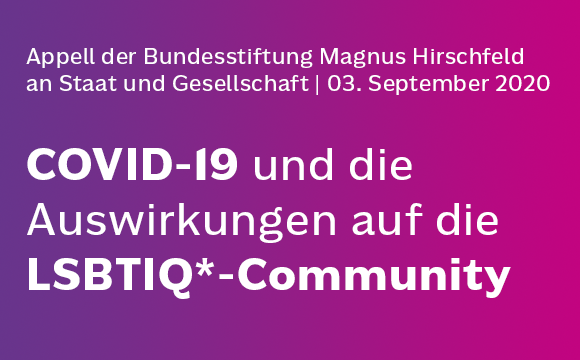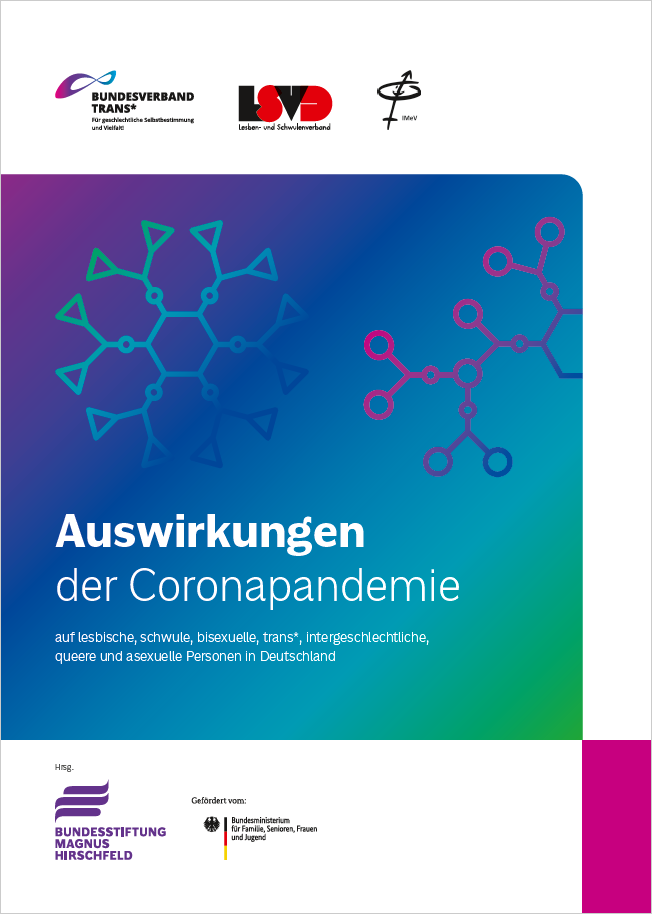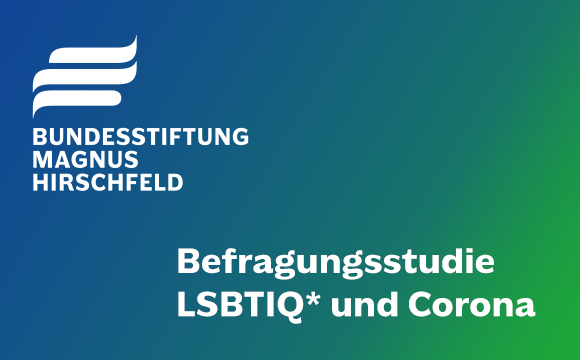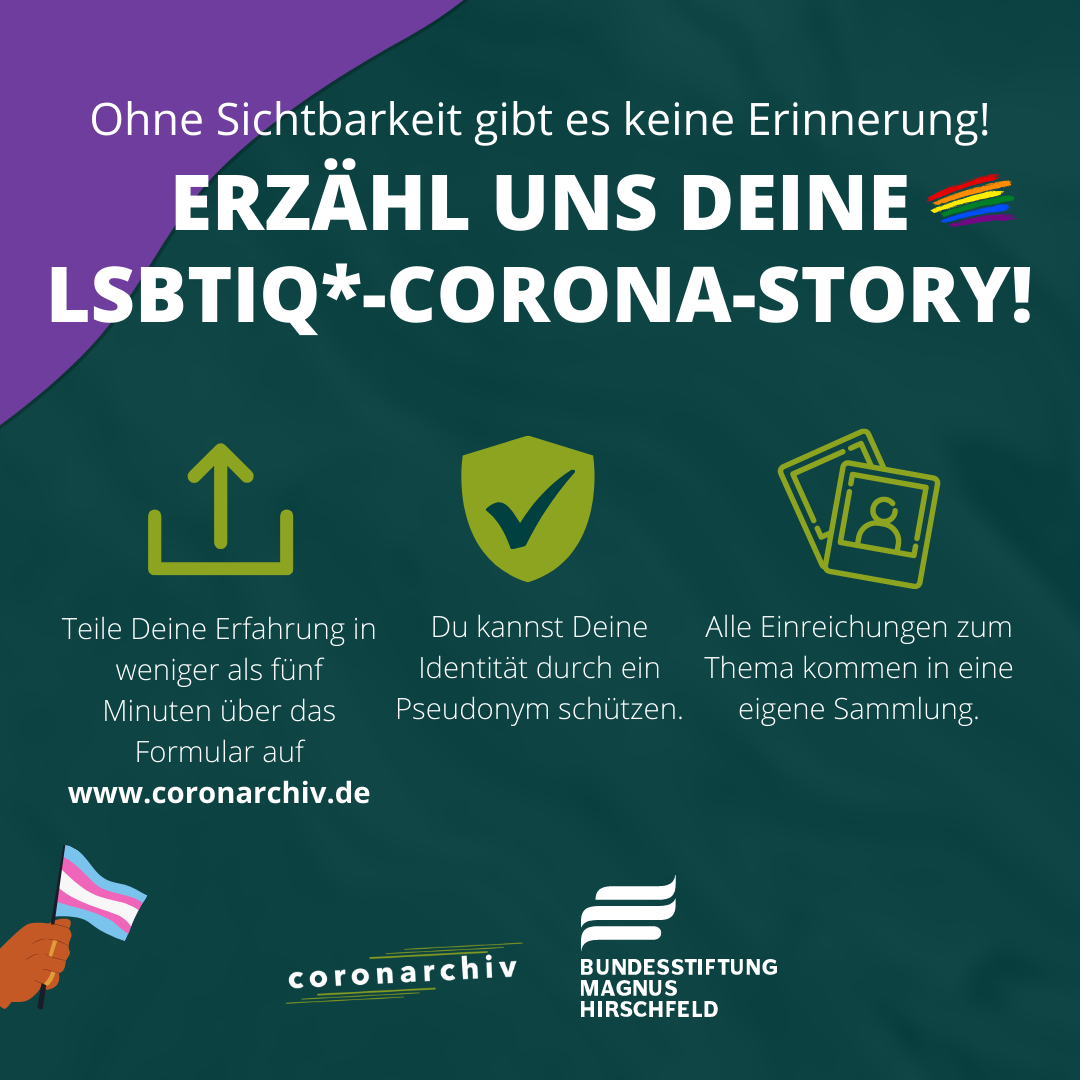Impact of the COVID-19 pandemic on LSBTIQ* individuals. It places additional pressure on the problem areas of our society: social and economic inequalities are exacerbated. People and groups who were already socially disadvantaged before are more severely affected by the pandemic restrictions and have fewer resources for handling the in part serious effects of COVID-19.
Lesbian, gay, bisexual, trans*, intergender, queer and asexual persons (LSBTIQ*) are faced with special challenges and hardships by the pandemic and associated political and legal measures and social changes. The Bundesstiftung Magnus Hirschfeld initially drew attention to the effects in an appeal and then systematically investigated them together with the Bundesstiftung Trans*, Intergeschlechtliche Menschen e.V. and the Lesben- und Schwulenverband.
Appeal of the Bundesstiftung Magnus Hirschfeld to state and society: COVID-19 and the effects on the LSBTIQ* community.

The Managing Director and Advisory Board of the Foundation drew attention to the effects of the Corona pandemic on LSBTIQ* in September 2020 and called to mind the obligations of the Federal Republic regarding general and human rights, especially the right to (physical and psychological) health and bans on discrimination. The appeal calls on federal, state and municipal government bodies, civil society and business organisations to take the special situation of the LSBTIQ* community into account in combating the pandemic.
The appeal is available here as PDF.
Brochure: Effects of the Corona pandemic on LSBTIQ

Several expert discussions were conducted with specialists from various fields in the context of a brochure partly financed by the Federal Ministry for Family Affairs, Senior Citizens, Women and Youth. In addition, LSBTIQ* organisations and initiatives were surveyed online on the effects of the Corona pandemic.
We identified four major subject areas in this regard: community structures, health, lockdown and contact restrictions and social debates and agenda setting
The goal of the brochure is to motivate and call on federal, state and municipal decision-makers in politics and administration to consider the effects of the pandemic on different groups. Getting into discussions with LSBT IQ* community representatives and preparing short- and long-term solutions with them is what counts.
The brochure is available here as double-sided PDF as well as barrier-free PDF.
Survey: LSBTIQ* community structures in the Corona pandemic
By means of an online survey, LSBTIQ* organisations and initiatives were asked how the pandemic had affected their work and users.
The survey involved 255 initiatives from every federal state. Among other things, these initiatives offer group and self-help opportunities for LSBTIQ*, advise and accompany LSBTIQ*, for example in coming-outs, transitions, discrimination experiences or legal questions and conduct educational events at schools.

Almost 90 percent describe the effects of the pandemic as negative, 18 percent even as extremely negative. During the Corona pandemic, they were only able to continue their activities and services to a limited extent. The digitalisation of services and development of hygiene concepts led to a greatly increased workload in many initiatives.
Many services were performed by work performed in an honorary capacity even before the pandemic. During the pandemic, the capabilities of those working in an honorary capacity decreased in 43 percent of the initiatives since the pandemic subjected individuals to an increased workload and they had fewer opportunities than before to get involved in an honorary capacity.
In almost a third of those initiatives that had financial resources before the pandemic, the financial situation deteriorated while 15 percent cannot yet assess the financial consequences.
The initiatives surveyed also registered a deterioration in the overall situation among the users of their services. Among the initiatives surveyed, 93 percent assumed that the psychological condition of their users had deteriorated and 67 percent that the physical condition had deteriorated. Moreover, those surveyed reported a perceived increase in experiences of violence of their users, both in private and public spaces. The experiences of public violence in particular affected people subject to multiple forms of discrimination. Consequently, the need for the services of the initiatives had probably increased rather than decreased.
The initiatives in part also reported positive accompanying phenomena of the pandemic, especially as a result of the digitalisation required. They were able to reach more users digitally and network them better. At the same time, it became clear that digital services also excluded many LSBTIQ* and many initiatives and users did not have the technical equipment required. The information of the initiatives made clear that digital services cannot replace but only supplement in-person services.
The initiatives listed many demands and recommendations to politics and administration to once again improve their work and the situation of their users. These in particular included demands to secure the financing of the initiatives in the long term, facilitate protected spaces for LSBTIQ*, guarantee the health provision and self-determination of LSBTIQ*, facilitate sex work, provide secure accommodation in particular for homeless and/or refugee LSBTIQ*, provide and distribute low-threshold information on the Corona pandemic and its measures and include LSBTIQ* life realities in political regulations.
You can download the research report on the survey study here. (pdf not barrier-free)
Tell your Corona story! – The Corona Archive collects Corona stories in cooperation with the BMH by and for LSBTIQ*

The new campaign addressed to the LSBTIQ* community of the Corona Archive began on 15 November 2021: LSBTIQ* persons are called on to report their personal experiences at www.coronarchiv.de.
“People and groups who were already socially disadvantaged are more affected by the restrictions in the pandemic,” according to Dr Daniel Baranowski, Managing Director of the BMH. “Your LSBTIQ* Corona story!” explicitly asks for the personal experiences of the LSBTIQ* community.
“The goal of our campaign is to collect these stories for the future and make them visible,” Luca Jacobs- project member at the University of Hamburg reported. “We have an historic opportunity here to collect the sources for future research live. The pandemic will eventually be over. How the pandemic is spoken and thought of in future depends to a great extent on what contemporary testimony is preserved.”
The Corona Archive is an open online archive of the universities of Hamburg, Bochum and Gießen. All citizens have been able to document their experiences and finds since the end of March 2020.
The Corona Archive is accessible in German, English, Spanish, Portuguese and Turkish and within a year has become the one the largest digital collections on the pandemic worldwide: over 5000 people have already contributed. And the contributions can be submitted both under real names as well as anonymously.
The BMH hopes that by cooperating in this vital project the experiences of LSBTIQ* can be made visible and ensure that queer history is told from the start.
If you have any questions on the subject “Effects of the Corona pandemic on LSBTIQ*”, feel free to contact:



